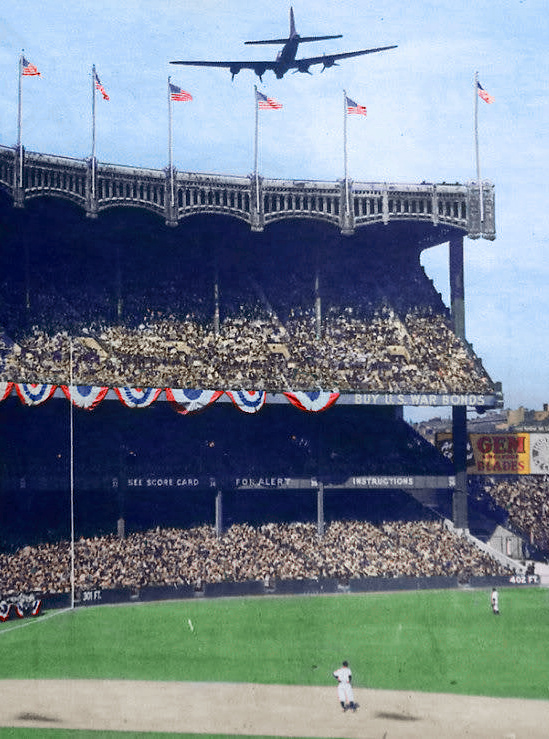The Village Smithy
By Chester L. Smith, sports editor
New York –
Maybe the critics and the money-changers are right about the World Series, but Joe Blow and his gang around the corner cigar store don’t think so. The great minds had made the Yankees a 6–5 favorite over the Cardinals as the opening game was run off today, but nobody seems to be paying much attention to them. There was rebellion in the street over these figures, and Yankee money was as scarce as No. 18 coupons. So, for that matter, was ready cash to back the Cards. It was one of those situations that is difficult to explain, unless the folks who fancy the American League Bombers are still suffering from the shock they received last October when the young and inhibitionless Redbirds took the Yanks apart and exposed them as being humans who can throw the ball away and strike out like the rest of the race.
No matter which club wins the series or how easy the victory is accomplished, it will always be a mystery why the National Leaguers went on the field at the Stadium this afternoon on the underside of the betting. Just on the face of it, they shaped up as a club that could repeat. They outhit the Yanks over the season and outpitched them, too. They can run and their defense doesn’t suffer by comparison. And don’t let anybody tell you they weren’t up against equally tough opposition all summer. Neither league was up to par, but the competition in the old wheel was as stiff as any Joe McCarthy’s outfit had to sweep aside.
It’s no secret how the Cards finished so far out in front. They won the close ones and they could also stand up and slug it out with anybody who liked it that way. The case of the Bostin Braves is typical. Your agent fell in with Casey Stengel in Chicago over the past weekend, and his tribute to the champions was grudgingly given but nonetheless sincere. Casey said:
We had good luck with nearly everybody but St. Louis. The Cubs – the Pirates – the Giants – Brooklyn – we either finished ahead of them for the season or got no worse than a tie. But the Cards – ouch! They licked us 17 in a row. They beat us when we were up and murdered us when we were down. No matter what we threw at ‘em, it wasn’t quite good enough.
It was the same story last year with the Yankees. They weren’t quite good enough. They were always within arm’s length of getting the upper hand, but the Southworths had that extra oomph to stay a stride ahead. In the opening game of the 1942 Series, Mort Cooper was knocked out and the Yanks went into the last of the ninth with a 7–0 shutout. At that moment, you would have sold the Cards down the river for a smoked herring, but they fell on Charlie Ruffing, batted him to the showers and had four runs over the plate and the bases full when Stan Musial made the final out. The Yanks didn’t know it, but that was their finish. The National Leaguers had discovered they weren’t being hexed by black magic and there was nothing wrong that a few base hits wouldn’t remedy.
The games were all close. Johnny Beazley won the second to tie the Series, 4–3, weathering a three-run New York rally in the eighth; Ernie White threw a shutout in the third with only one run to work on until the ninth; there was a three-run difference in the fourth battle and the tally in the fifth and last was 4–2. It couldn’t be said that the Yankees collapsed; it was simply that their best fell a trifle short.
Granting that Yank pitching has the edge on paper, it is also true that the Cardinals, as a team, are 30 points stronger at the plate, have three .300 hitters to one for New York.
The sharps were saying today that there are a trio of key players who can make or break St. Louis.
One is Stan Musial. His better-than-.350 batting average has been the clincher for more victories than Billy Southworth can count on all his fingers and toes. If he keeps up the pace in the Series, he can be counted on to account for one or two runs per game, perhaps more, but should he drop into a slump, the result could be disastrous.
The second man who isn’t expendable is Walker Cooper, generally rated the top catcher in the game. Cooper was a fireball last year, not only at the plate but in the skillful manner that he handled the young pitchers and kept baserunners hugging the bags. As in Musial’s case, he could make or break the club, depending on how he goes.
Walker’s brother, Morton, is No. 3. After the miserable luck he has had against American League batters, St. Louis strategy has to be built on the basis that he will fail once more – but suppose he doesn’t? One game on the winning side for Cooper, the wise heads say, could turn the whole Series, while two might make it a walk-away.
We’ll be knowing more about it during the next three days, but that price of 6–5 still looks cockeyed.
